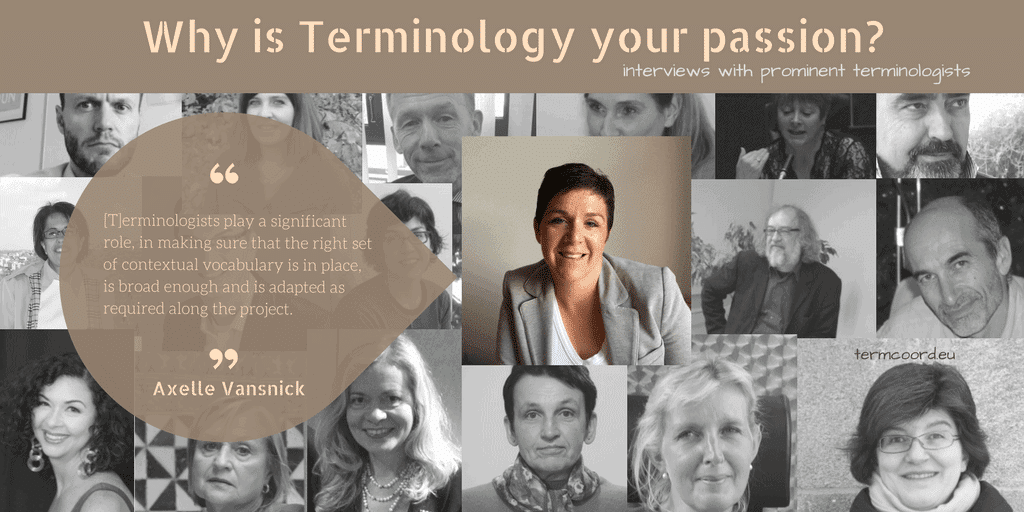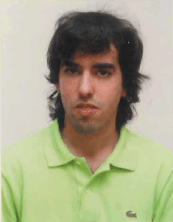Axelle Vansnick is a Terminologist at the NATO Standardization Office (NSO), where she works on the coordination of terminology proposals and the promotion of standardized terminology within NATO.

1. Could you tell us about your academic studies and professional experience?
After Translation studies in Belgium (@ Ecole d’Interprètes Internationaux in Mons), I moved to Rennes in France to take a Master course in Translation, Localization and Technical Writing. Thanks to this Master, I discovered the importance of terminology not only in translation but also in areas such as technical writing and business communication. I remember varied, unusual topics… like a dictionary project for the breadmaking industry!
As part of my Master studies, I spent five months as an intern in a Translation/Localization company in Brussels, called Hitext. Hitext offered me my first long-term contract as Junior Translator. That was really the starting point: my entrance in the world of translation!
A few years later, I got the opportunity to work for a major player in the translation sector: SDL. For me, SDL was a dynamic and fast-evolving environment, with many opportunities for career development. I started as Translator and ended as Divisional Director.
However, after 12 years in the private business sector, I felt the need to experience translation and terminology differently. Hence my application to NATO and my current job: Terminologist in the NATO Terminology Office (NTO), which is part of NATO Standardization Office (NSO).
2. As a terminologist, what kind of tasks do you have in the NATO Standardization Office and how is it like working there?
Our work comprises two main blocks: the coordination of terminology proposals and the promotion of standardized terminology within NATO.
As part of the coordination, we check every terminology proposal sent to the NTO for consistency with our internal guidance for writing terminology but also for consistency with existing NATO Agreed terminology. If necessary, we initiate a dialogue with the relevant experts. When all parties are happy with the substance and the form of the proposed terminological entry, we submit the proposal to the responsible senior committee known as tasking authority (or the body to which it delegates this responsibility). Once approved, we update the terminology database, NATOTerm, with the approved terminological entry.
As part of the promotion, we conduct workshops on terminology standardization within NATO. As and when the need arises, we take part in expert meetings and help them develop their core terminology. Occasionally, we are requested to chair meetings dedicated to terminology development.
3. Terminology standardization is an official policy objective at NATO. How do terms become recognised as “NATO Agreed terminology”?
Terminology acquires the NATO Agreed status once it has been approved by consensus of all NATO nations in certain senior committees, in coordination with the NTO and the relevant experts.
4. Is IATE, Interactive Terminology Database for Europe, used in the NATO Standardization Office?
We use IATE from time to time. In fact, one of our core principles is: Do not reinvent the wheel… Concretely, when the terminology under development is not specific to NATO, we check if and how the underlying concept is defined by other organizations such as EU institutions, UN bodies and standards developing organizations. In this respect, IATE is an essential source of information, especially given the amount of subject fields and its multilingual nature.
5. What are your thoughts on the roles of terminologists when dealing with new technologies, such as machine translation?
In my current job, I am not exposed to new technologies such as machine translations. However, in my previous job, I had the opportunity to work on the preparation of an ambitious machine translation project for a major car manufacturer. For certain content types and business constraints, machine translation makes sense. However, the quality of the MT output depends a lot on the construction and maintenance of the underlying dictionary. This is where terminologists play a significant role, in making sure that the right set of contextual vocabulary is in place, is broad enough and is adapted as required along the project.
Interviewed by Pedro Ramos – Translator, Social Media and Content Manager, former Communication Trainee at the Terminology Coordination Unit of the European Parliament (Luxembourg).
 Figueira da Foz (Portugal). Pedro has a BA in Modern Languages: English (University of Coimbra, Portugal) and a BA in Modern Languages in Foreign Languages: English and Spanish (B) (University of Coimbra). He wrote a dissertation about the Woodstock Festival of 1969, Woodstock: Community and Legacy, for his MA in English and American Studies: American Studies (University of Coimbra). He also developed the website for the Dundee Botanic Garden Endowment Trust for his MSc in Information Technology and International Business (University of Dundee, Scotland). He was a translator and a member of the University of Coimbra team in the ELVIN Project of the EU Lifelong Learning Programme. He was also a social media manager and member of the Organising Committee of the 2nd International Graduate Conference in English and American Studies, which was held at Faculty of Arts and Humanities of the University of Coimbra. Recently, from 1st April 2017 to 30 June 2017, he was a trainee in the Portuguese Translation Unit, and, from 1st July 2017 to 30 September 2017, in the Terminology Coordination Unit, Directorate-General for Translation of the European Parliament (Luxembourg).
Figueira da Foz (Portugal). Pedro has a BA in Modern Languages: English (University of Coimbra, Portugal) and a BA in Modern Languages in Foreign Languages: English and Spanish (B) (University of Coimbra). He wrote a dissertation about the Woodstock Festival of 1969, Woodstock: Community and Legacy, for his MA in English and American Studies: American Studies (University of Coimbra). He also developed the website for the Dundee Botanic Garden Endowment Trust for his MSc in Information Technology and International Business (University of Dundee, Scotland). He was a translator and a member of the University of Coimbra team in the ELVIN Project of the EU Lifelong Learning Programme. He was also a social media manager and member of the Organising Committee of the 2nd International Graduate Conference in English and American Studies, which was held at Faculty of Arts and Humanities of the University of Coimbra. Recently, from 1st April 2017 to 30 June 2017, he was a trainee in the Portuguese Translation Unit, and, from 1st July 2017 to 30 September 2017, in the Terminology Coordination Unit, Directorate-General for Translation of the European Parliament (Luxembourg).
